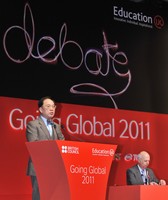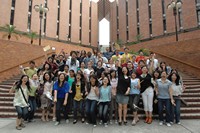 |
| No.2 April, 2011 |
|
| |
|
| |
Hong Kong aspires to be education hub |
|
| |
|
|
| |
 Addressing the "Going Global 2011 Hong Kong: The International Education Conference", the Chief Executive, Mr Donald Tsang, shared with the audience some of the things Hong Kong has been doing to raise the quality of education and broaden the horizons of students. Addressing the "Going Global 2011 Hong Kong: The International Education Conference", the Chief Executive, Mr Donald Tsang, shared with the audience some of the things Hong Kong has been doing to raise the quality of education and broaden the horizons of students.
Mr Tsang noted that the number of international students globally is estimated to rise to 7.6 million by 2025, with some 70% of them headed for Asia.
A general trend for children nowadays is to study in different countries to broaden their horizons. And cities such as Hong Kong welcome students from around the globe to their schools and universities.
 "Naturally, there is a great deal of competition among cities to attract the right students by providing the best possible learning environment. Each city has its own attributes, while students have their own aspirations and expectations. "Naturally, there is a great deal of competition among cities to attract the right students by providing the best possible learning environment. Each city has its own attributes, while students have their own aspirations and expectations.
"The trick is to enhance a city's advantages to match the ever-higher expectations of its people, including young people and students.
"For Hong Kong, that means treading a familiar path as a premier gateway into and out of Mainland China. It must also provide a stepping stone for Mainland and local students to experience the wider world," Mr Tsang said. Against this background, Hong Kong aspires to become a regional education hub. Promoting educational services is a priority objective of the Hong Kong Government, he said.
Noting that one of the factors that distinguishes Hong Kong from other cities is its high degree of internationalisation, Mr Tsang pointed out that in the recently published Globalisation Index 2010, Hong Kong ranked as the world's most globalised city.
Mr Tsang said the Hong Kong Government places a high priority on education. In the financial year starting on April 1, HK$54 billion (A$6.75 billion) will be spent on education, almost a quarter (22.5%) of the total recurrent expenditure. It is the largest spending for any policy area.
As well as providing financial resources, the Government also is determined to enhance and broaden the educational environment.
The non-local student quota has been doubled to 20%. Government scholarships and fellowships have been established. Employment and immigration restrictions on non-local students have been relaxed.
The international school sector is also being expanded and diversified. One of Britain's top public schools, Harrow International School, is coming to Hong Kong and is scheduled to open its doors here in August next year, joining more than 50 international schools already in Hong Kong.
Mr Tsang then gave a brief update on the recent education reforms in Hong Kong. He noted that since September 2009, a new academic structure has been implemented in Hong Kong, marking a significant change.
12 years of free education (six years primary and six years secondary) will be provided, followed by a four-year undergraduate programme. In other words, the duration of undergraduate programmes in Hong Kong will change from three to four years starting from the 2012/13 academic year.
The secondary school exam process has been streamlined, with a single exam after Year 12 replacing the current two public examinations.
The new exam, the Hong Kong Diploma of Secondary Education, or HKDSE and the new curriculum are internationally benchmarked and recognised.
"Our reforms have received an encouraging response from academic communities in Britain, the USA, Canada, Australia, as well as Mainland China. They will help to better prepare our students for university education at home and abroad," Mr Tsang said.
|
|
| |
|
|
|
| |
 |
|
|
| |
|
|
|
| |
|
|
|
|
 |

